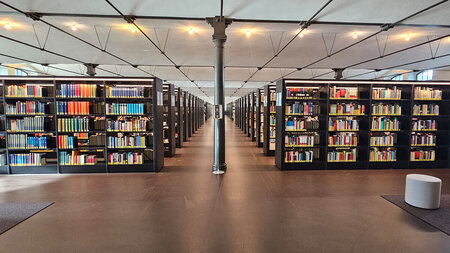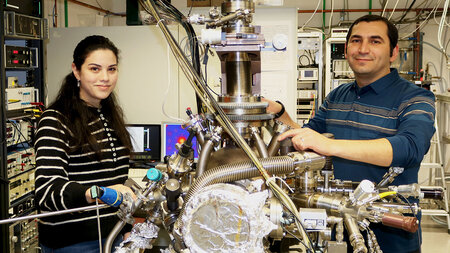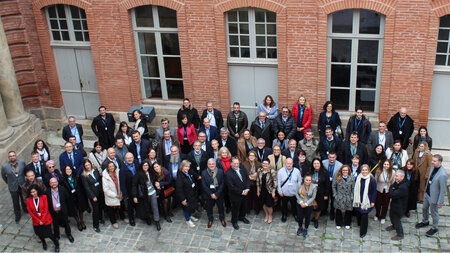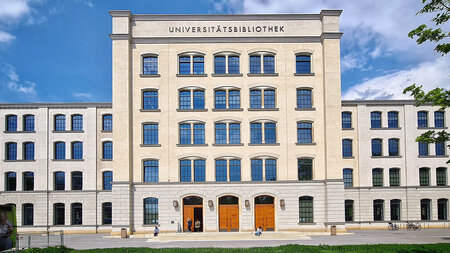The basic concept of mechatronics transferred to material level
Nine questions for Prof. Dr. Welf-Guntram Drossel, Professor for Adaptronics and Lightweight Design in Production since April 2014
-

Prof. Dr. Welf-Guntram Drossel holds the Professorship for Adaptronics and Lightweight Design in Production that ist unique in Germany. Photo: Fraunhofer Institute for Machine Tools and Forming Technology IWU
Prof. Dr. Welf-Guntram Drossel (47) holds the Professorship for Adaptronics and Lightweight Design in Production at the Faculty of Mechanical Engineering since April 2014. In nine answers he gives the readers of “University News“ an insight into his career, goals and time in Chemnitz.
“Adaptronics and Lightweight Design in Production” is your area of expertise. What do you mean by this?
Adaptronics transfers the principles of mechatronics – intelligent systems with a combination of mechanical structure, sensors and actuators and information processing – up to the material level. Basis of adaptronics are the so-called smart materials. These materials change their properties due to external influence such as electromagnetic fields, temperature or light. Smart materials are integrated directly into the components and act as sensors and actuators. Such structures allow complex functions with a very simple structural design. Potential applications include vibration damping and noise reduction of lightweight structures, integrated monitoring systems, such as blades of wind turbines, precision positioning systems for micro processing, integration in endoscopes or medical implants. These functionally complex systems require new, integrative technologies for product development and production.
TU Chemnitz is the right choice for me as a professor, because…
…an interdisciplinary culture of research and teaching has been developed here. Also, it is located not far from other non-university research facilities, such as the Fraunhofer Institutes IWU and ENAS. The cooperation with these is inevitable for modern research areas like adaptronics.
Can you say a few words about your academic career so far?
From 1987 to 1992 I studied Information Technology at TU Dresden. Subsequently, I became a research assistant at the Institute of Metal Forming at TU Bergakademie Freiberg until 1998. In 1998 I gained my PhD in the field simulation of forming processes. Since 1999 I work for Fraunhofer Institute for Machine Tools and Forming Technology IWU. Among other things, I developed the area of adaptronics in Dresden since 2001. Since 2008, I am a lecturer for machine tools and forming technology at TU Chemnitz.
Describe your study time in only a few words.
Extremely exciting technically and scientifically. And since my study time fell right into the time of German Unification, it was also extremely defining for me personally.
Do you have a word of advice for young students and graduates?
Determination should not prevent you from following your own dreams and passions. Only what you do with pleasure you do well.
What are your future goals in teaching?
The training of young scientists for interdisciplinary research is of special importance for me. This requires the ability to abstract as main basis for the dialogue between different disciplines. Therefore teaching of elementary engineering capabilities is just as essential as teaching modern simulation methods.
What impact does your research have at TU Chemnitz?
I am currently the speaker for the Collaborative Research Center SFB/TRR 39 PT-PiESA “Production Technologies for light metal and fiber reinforced composite based components with integrated PIEzoceramic Sensors and Actuators“. Also, I am board member of the Cluster of Excellence MERGE. Both are large research networks in the field of production technologies for multifunctional lightweight structures. Those networks should be stabilized and expanded – even in the context of the major challenges of Industry 4.0 and resource-efficient production.
There are around 45,000 professors at German universities. What distinguishes you from all others?
There is only one Professorship for Adaptronics and Lightweight Design in Production in Germany and it is located at TU Chemnitz.
What do you show your guests in Chemnitz?
The Chemnitz Art Gallery and the Chemnitz Museum of Industry.
Further information about the professorship at: https://www.tu-chemnitz.de/mb/adaptronik/index.php.en
(Translation: Nataliia Boiko)
Katharina Thehos
22.04.2015





